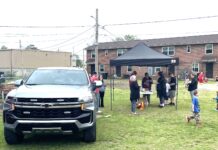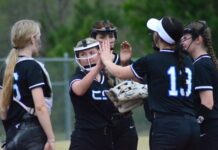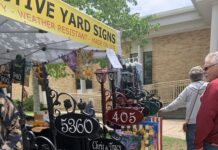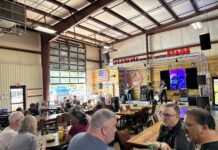CULLMAN COUNTY – Before the 2018 legislative session kicks off in Montgomery on Jan. 9, The Tribune caught up with area Representatives Corey Harbison, R-Good Hope and Randall Shedd, R-Fairview to talk about what citizens might expect to see coming out of Montgomery this year.
What’s coming up in this session?
Harbison responded, “I think this is going to be a short legislative session. I think that, from what I understand, we’re going to get in, we’re going to pass a few bills, and try to get our budgets finished, and get out early. We go in Jan. 9, which is fairly early for us to go in. We’ve got up to 30 legislative days to do the State’s business and adjourn, but I don’t think we’ll go 30 days. I think we’re going to have a short session. I don’t see much legislation coming.
“I think that everybody’s just wanting to get down and get out, and I think the state will appreciate that. You know, I’ve always said we probably do more damage when we’re in session than when we’re out of session. In my four years in the Legislature, I haven’t really introduced much legislation. We’re at a point where it’s just as important to stop legislation as it is to introduce and push legislation, because there’s a lot of bad bills that get introduced and pushed in Montgomery.
“I think our job is to go to Montgomery and do the business for the people that’s going to improve the life of Alabamians. And I think a lot of times we get caught up in going down and passing bills to make a statement or to pander, and I don’t think that is our job. We’ve got to look out for the well-being of the state, and I think that a lot of people get fed up because of the pandering and waste of time.”
Said Shedd, “Most legislators want this to be a quick and smooth session, but I’m not sure it will turn out that way. I expect the minority party will be doing everything (it) can to cause the majority party to take bad votes and make us look bad, delay and filibuster, but we’ll have to work through it and make sure the state functions. Priority will be on passing budgets as soon as possible and addressing pressing issues like prison court-orders, mental health, and I think broadband infrastructure will be addressed.”
What does the daily life of a representative look like during the session?
According to Shedd, “It depends on committee meeting schedules. Typically, we arrive on Tuesdays for legislative voting, have committee meetings on Wednesday and voting sessions again on Thursday. Caucus meetings, receptions etc. usually take the day into the night. Last session, we actually were in session until 3 a.m. one time, but that is rare. Several times we’ve been in session until 10-11 p.m. When we are in session, we have to stay close to the floor in case a quick vote happens. We really have to watch for trickery.”
Said Harbison, “What we typically do is we go in on a Tuesday morning; we’ll have session that day and we’ll stay in pretty late. And then Wednesday is committee day, so we have committee bills on Wednesday. Any bill that’s introduced, it goes to a certain committee, and then the committee either approves it or kills it. If they approve it, it goes to the full House or Senate, depending on which house it starts in first. Then Thursday is a session day again. It’s three days a week, most of the time.”
There are exceptions, though. Harbison related an incident from last year, in which a single bill took three days to process due to stalling tactics used in an effort to change the bill before voting.
Children’s Health Insurance Program (CHIP) / ALL Kids
The national health insurance program for children has been threatened recently with cutbacks or even suspension due to issues in the federal government, including the recent near shutdown during inter-party conflict in Congress. For now, ALL Kids is safe, though its long-term stability remains uncertain.
The Alabama Department of Public Health recently posted in its website:
“Important Update: With the continuing resolution passed by Congress on December 21, 2017, ALL Kids will not freeze enrollment on January 1, 2018 nor terminate coverage on February 1, 2018. Further updates to come as Congress needs to pass full, long term funding for the Children's Health Insurance Program (CHIP).”
Does Alabama have a contingency plan, should the federal government fail to preserve funding for CHIP?
“I believe Congress will come up with a permanent solution, but I know we absolutely do not want this important service to end in our state,” commented Shedd. “Last year, the House insisted on saving $90 million to carry over for this year and one thing we discussed is we may have to spend it on children’s health if Congress does not come through. That would make it tough on other state services if we had to.”
Harbison shared, “I don’t know where the State could step up and do anything, because the State’s broke at this point. Unless there’s an additional funding source that comes in, the State can’t pick up the slack at this point, unless there’s a tax increase or an additional funding source from the federal government.
“And it’s very important,” Harbison continued. “A lot of kids need it. You hate to see kids punished who can’t help the situation they were brought into in this world. I think we have an obligation as humans to help take care of them. The kids, they’re helpless, but it’s going to be hard for the State to do anything.”
Cullman County gasoline and diesel fuel taxes
For a legislator to use the word “tax” in a sentence without the word “cut” immediately following it is a dangerous thing, but there could be a bill before the State Legislature in 2018 that would add 3 cents to Cullman County’s current 1-cent gasoline tax, and create a 4-cent tax on diesel fuel, contingent upon a countywide vote in the November general election. According to the proposal submitted to the Cullman County Mayors and Commissioners Association in December, the revenue generated by the taxes would be earmarked specifically for materials to be used in the repair and reconstruction of roads and bridges inside Cullman County.
About the bill, Shedd was brief. “The local gas tax is strictly up to the voters. We’ve had a lot of people tell us they want roads fixed and (are) willing to pay more, but that is up to the people to decide that.”
Harbison stated, “If anything is passed for a local fuel tax, what the mayors and the commissioners agreed on–the first key thing–is that the citizens of Cullman will get a vote on it. I think what they want to do is they want to get a plan together and say, ‘This is how much revenue we’re currently getting, this is where it goes, this is how much it takes to pave a mile of road, this is how much it costs to repair a bridge, this is how much it costs to replace a bridge;’ put all this information out to the citizens of the county, and then let the people vote whether they’re willing to pay a little more for better roads, or they’re happy like they are. Leave it in the hands of the citizens.”
The final word
The Tribune gave each representative an unprompted opportunity to share his own thoughts about the Legislature and his role in it with his constituents before he heads to Montgomery.
Shedd told us, “I am really proud of the way the House of Representatives responded to the corruption problems in our state. We addressed it. We made sure we didn’t weaken the ethics laws just because some of our colleagues got caught up in them, and we elected a new speaker of the house that is a breath of fresh air in Montgomery. We’ve got a new speaker of the house, a new governor, and I think we have a new mindset. I feel good about the future, even though the recent past has not been good. We’ve changed Montgomery, in my opinion.”
Harbison shared, “This was my first four years in the Legislature. I just appreciate the people of Cullman giving me the opportunity to serve them in this capacity. I hope that I’ve represented the people well, and I always try to think, when I cast my vote, it’s not what does Corey Harbison want; It’s what do the people of Cullman want, and that’s the way I try to look at things.
“Anybody can look at one certain bill and criticize, and not be happy with it, but I hope that the people of Cullman, when they judge and rate me as a legislator, that they look at me as a whole in all of my bills and say, ‘Overall, Corey’s done a fair job representing us,’ because we do know it’s election time rolling around, so that’s always important. But, either way, it’s been a pleasure to work for the people, and I try to make myself available online, on Facebook. I put my phone number out, I interact, and I’m just proud to work for the people.”
Copyright 2017 Humble Roots, LLC. All Rights Reserved. Image courtesy of State of Alabama





























